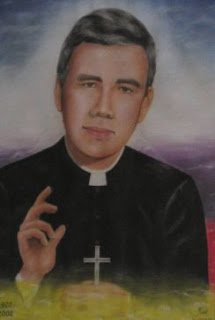El Salvador's next saint?
Thomas M. Kelly wrote in America magazine in June 2016:
What Father Grande learned and lived out was a simple truth: Until the marginalized communities he served created their own agency, until they acted upon their own reality as a church community, nothing would change. An outside leader could not come in and transform poor communities. Only local lay church leaders could encourage communities to become agents of their own change. The role of the Catholic Church, he believed, was to help those leaders emerge, support them, form them and walk with them. Inspired by the Gospel, these community leaders would become the most effective agents for the integrated development of their communities.
For two years Father Grande and his team led a delicate “mission” to very poor communities around his hometown. Through their own reading of Scripture, these communities came to realize that it was not God’s will that they remain poor. Building the kingdom of God meant they needed to advocate for their communities in ways that were peaceful—but forceful. Throughout Father Grande’s pastoral “experiment” in the rural villages of El Salvador, Archbishop Romero carefully watched his friend and confidant try to apply the social teaching of the church to the reality of poor, oppressed rural communities.
Slowly people began to change their mindset and realize their oppression was not the will of God but actually contrary to God’s love for them. But as their awareness and demands for change grew, so, too, did the danger they faced. Soon threats came in against both Father Grande and the communities he served, mainly from wealthy landowners who felt threatened by the priest’s work encouraging rural farmers to organize for a better life. Archbishop Romero witnessed the risks taken by Father Grande and saw the road he willingly chose in defense of the people he loved. On March 12, 1977, Father Grande was assassinated by government death squads at the behest of wealthy landowners.
Kelly is the author of the splendid book, "When the Gospel Grows Feet: Rutilio Grande, S.J. and the Church of El Salvador."
The online periodical ContraPunto published in 2015 an interview with Julio Sánchez, a member of El Salvador's National Guard, who admitted to his participation in the 1977 assassination of Father Rutilio Grande, a Jesuit priest. Here is an English translation of a short portion of the interview:
Pope Francis, a Jesuit, has often spoken about Father Grande. Vatican News covered remarks by Pope Francis in Panama earlier this year:
The online periodical ContraPunto published in 2015 an interview with Julio Sánchez, a member of El Salvador's National Guard, who admitted to his participation in the 1977 assassination of Father Rutilio Grande, a Jesuit priest. Here is an English translation of a short portion of the interview:
What happened on March 12, 1977, when they ambushed the Father Rutilio Grande?
"There were orders we received directly from the director of the National Guard (General Ramon Alfredo Alvarenga served as director general of the National Guard from 1975 to 1978). We were selected as eight members of the guard; I was not in charge of the operation. I think we were six or eight (members of the guard) that were selected to fulfill the mission."
Did you know who you were going to kill? - I asked him, looking in his eyes for an honest answer, Julio repeatedly moves his hands and head due to Parkinson's disease.
"We had been instructed to eliminate the priest, because he was a communist, he was raising up the peasants, and spoke ill of the government," he concludes agitated....
How was he ambushed? Where were you waiting? Were you dressed in civilian clothes or uniforms?
"We were going plainclothes, but a few miles before, elements of the guard elements were uniformed. They informed us that the car was heading toward us, so we waited in the street, and when it appeared we opened fire, opened fire all at the same time from different points in the road. I saw the car go off to the side and we continued shooting."Read the rest (in Spanish) here. Sanchez died in 2015 in a hospital in Los Angeles.
Pope Francis, a Jesuit, has often spoken about Father Grande. Vatican News covered remarks by Pope Francis in Panama earlier this year:
“I am very close to Rutilio”, the Pope reportedly said, revealing that he treasures a scrap of bloodied fabric from Romero’s vestment and a catechesis notebook belonging to Rutilio. He spoke of them as two prophetic figures highlighting how the martyrdom of Rutilio ‘converted’ Romero, and he reflected on how misconceptions and confusion regarding liberation theology almost halted the canonization process for the Salvadoran saint. “The important thing”, he said, is not to be overwhelmed by ideology but to follow Rutilio’s example “who never wavered but did what he had to do”.Rutilo Grande's process towards possible beatification and eventual canonization as the second saint from El Salvador was commenced in 2016. Pope Francis has stated that the process is going "very well" and the archbishop of San Salvador told the press the process has "advanced greatly"
Today's anniversary was commemorated with a procession from the site of Rutilio Grande's murder along the road to the church in El Paisnal where he served his beloved community.
There is a photogallery here with various images from Rutilio's life.

Comments